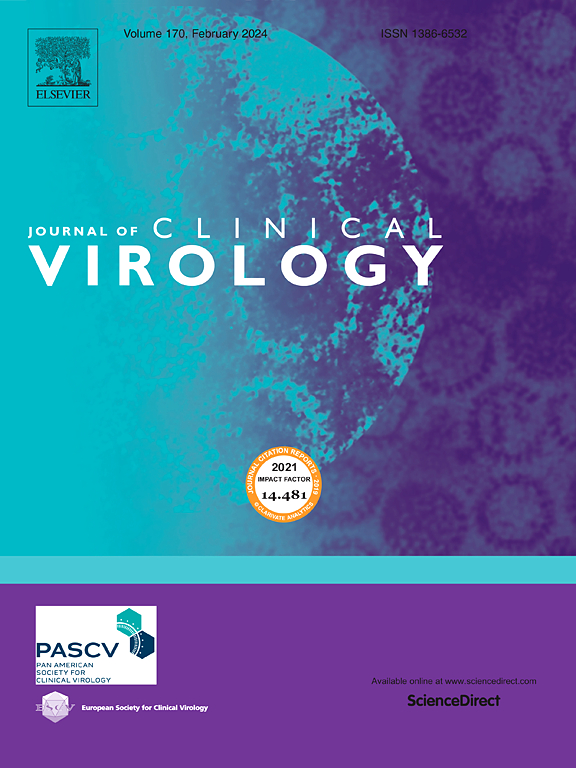What have we learned from animal studies of immune responses to respiratory syncytial virus infection?
IF 3.4
3区 医学
Q2 VIROLOGY
引用次数: 0
Abstract
Respiratory syncytial virus (RSV) is a common cause of severe respiratory tract infection at the extremes of age and in vulnerable populations. However, it is difficult to predict the clinical course and most infants who develop severe disease have no pre-existing risk factors. With the recent licencing of RSV vaccines and monoclonal antibodies, it is important to identify high-risk individuals in order to prioritise those who will most benefit from prophylaxis. The immune response to RSV and the mechanisms by which the virus prevents the establishment of immunological memory have been extensively investigated but remain incompletely characterised. In animal models, beneficial and harmful immune responses have both been demonstrated. While only chimpanzees are fully permissive for human RSV replication, most research has been conducted in rodents, or in calves infected with bovine RSV. Based on these studies, components of innate and adaptive immune systems, cytokines, chemokines and metabolites, and specific genetic and transcriptomic signatures are identified as potential predictive indicators of RSV disease severity. These findings may inform the development of future human studies and contribute to the early identification of patients at high risk of severe infection. This narrative review summarises the factors involved in the immune response to RSV infection in these models and highlights the relationship between potential biomarkers and disease severity.
我们从呼吸道合胞病毒感染免疫反应的动物研究中学到了什么?
呼吸道合胞病毒(RSV)是极端年龄段和易感人群发生严重呼吸道感染的常见原因。然而,临床病程很难预测,而且大多数患严重疾病的婴儿都没有预先存在的危险因素。随着 RSV 疫苗和单克隆抗体最近获得许可,确定高危人群以便优先考虑那些从预防中获益最多的人就显得非常重要。人们对 RSV 的免疫反应以及病毒阻止免疫记忆建立的机制进行了广泛研究,但对其特征的描述仍不完整。在动物模型中,有益和有害的免疫反应都已得到证实。虽然只有黑猩猩完全允许人类 RSV 复制,但大多数研究都是在啮齿动物或感染牛 RSV 的小牛身上进行的。基于这些研究,先天性免疫系统和适应性免疫系统的成分、细胞因子、趋化因子和代谢物以及特定的基因和转录组特征被确定为 RSV 疾病严重程度的潜在预测指标。这些发现可为未来人类研究的发展提供参考,并有助于早期识别严重感染高风险患者。本综述总结了这些模型中对 RSV 感染的免疫反应所涉及的因素,并强调了潜在生物标志物与疾病严重程度之间的关系。
本文章由计算机程序翻译,如有差异,请以英文原文为准。
求助全文
约1分钟内获得全文
求助全文
来源期刊

Journal of Clinical Virology
医学-病毒学
CiteScore
22.70
自引率
1.10%
发文量
149
审稿时长
24 days
期刊介绍:
The Journal of Clinical Virology, an esteemed international publication, serves as the official journal for both the Pan American Society for Clinical Virology and The European Society for Clinical Virology. Dedicated to advancing the understanding of human virology in clinical settings, the Journal of Clinical Virology focuses on disseminating research papers and reviews pertaining to the clinical aspects of virology. Its scope encompasses articles discussing diagnostic methodologies and virus-induced clinical conditions, with an emphasis on practicality and relevance to clinical practice.
The journal publishes on topics that include:
• new diagnostic technologies
• nucleic acid amplification and serologic testing
• targeted and metagenomic next-generation sequencing
• emerging pandemic viral threats
• respiratory viruses
• transplant viruses
• chronic viral infections
• cancer-associated viruses
• gastrointestinal viruses
• central nervous system viruses
• one health (excludes animal health)
 求助内容:
求助内容: 应助结果提醒方式:
应助结果提醒方式:


